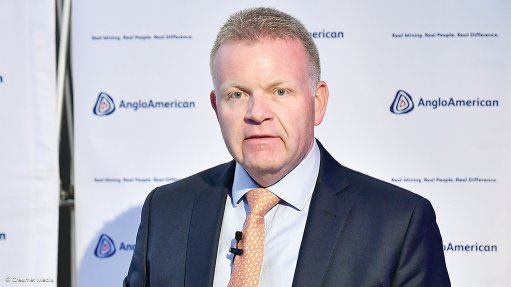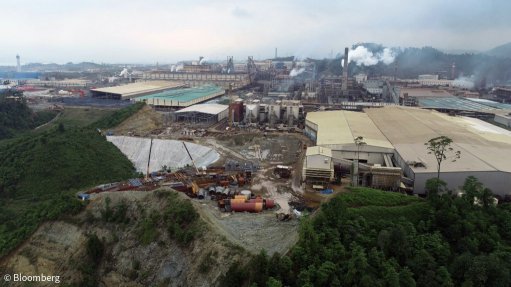South African port operator pursuing R8bn OEM strategy in bid to bolster equipment performance

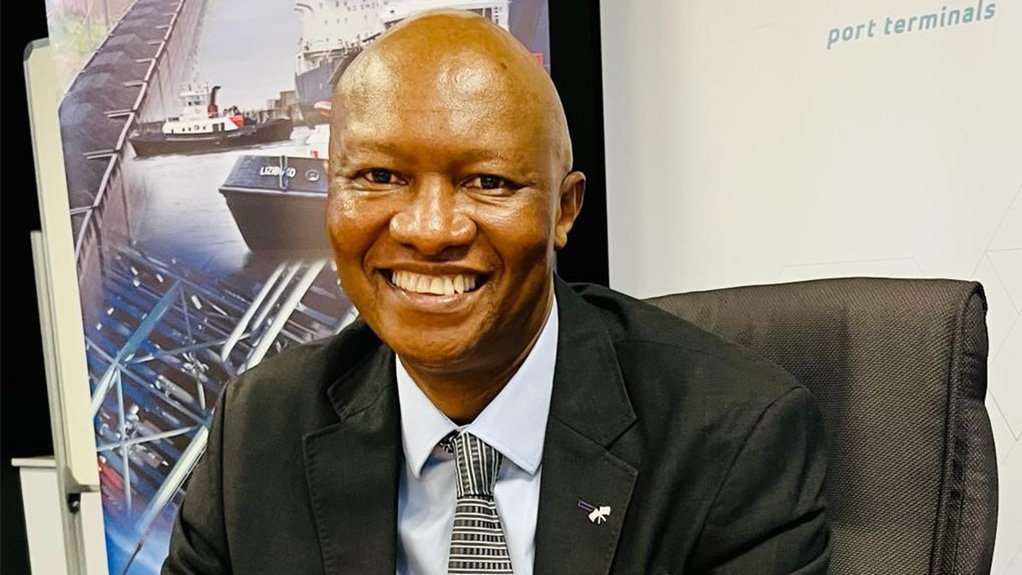
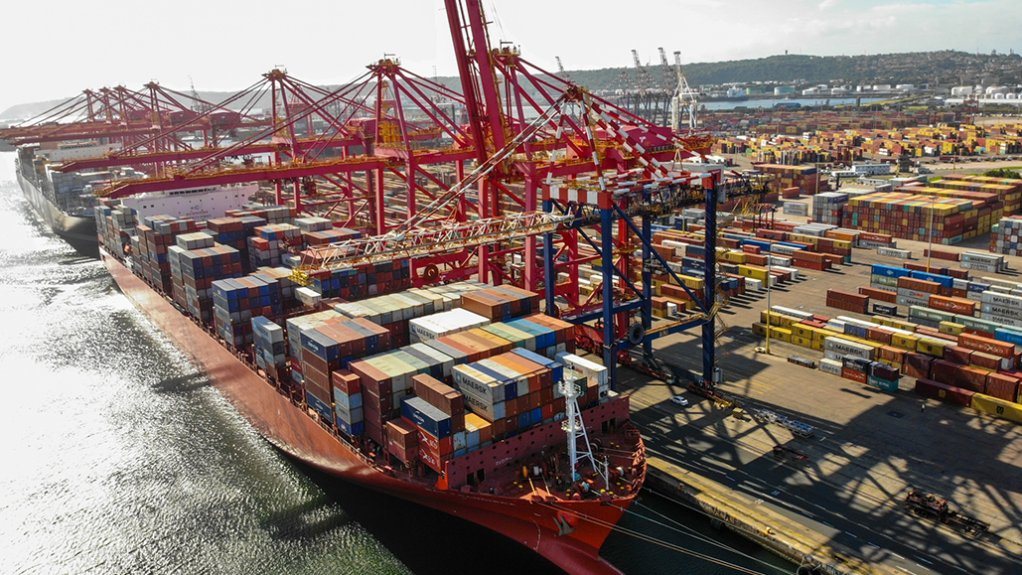
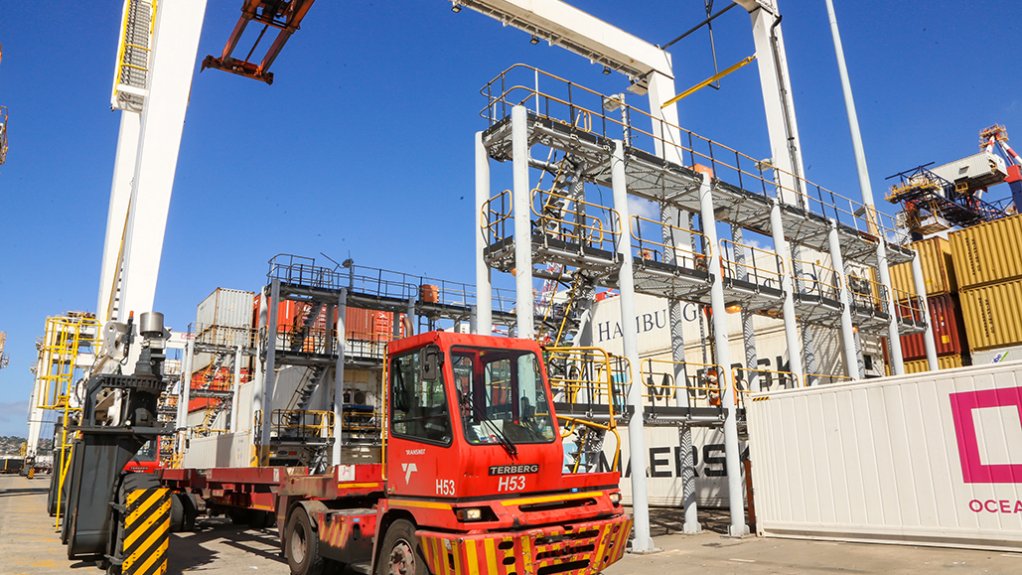
Transnet Port Terminals CEO Jabu Mdaki
TPT expects to invest just over R8-billion over the next five years
TPT will invest in over 700 pieces of equipment ranging from ship-to-shore cranes, rubber-tyred gantry cranes and straddle carriers to haulers, trailers and forklifts.
Transnet Port Terminals (TPT) is optimistic that its emerging strategy of entering into long-term agreements with original-equipment manufacturers (OEMs) for the supply and life-cycle maintenance of key port-handling equipment will position the business for significantly higher levels of efficiency across its 16 terminals, which have faced significant disruption in recent years.
CEO Jabu Mdaki tells Engineering News that the strategy will be deployed in phases and involves contracting directly with the OEMs for 11 pieces of key equipment, initially starting with rubber-tyred gantry cranes.
The scope of the tender, which closes on May 2, includes the asset lifecycle management of the equipment by the OEMs and also covers the spares replacement, as well as the maintenance and refurbishment of the equipment.
“The anticipation is to have the contracts for the first batch of equipment in place by September.
“These will be over a period of 10 years for acquisition and 20 years for asset lifecycle management,” Mdaki explained during an interview.
“Over the next five years, TPT will invest in over 700 pieces of equipment ranging from ship-to-shore cranes, rubber-tyred gantry cranes and straddle carriers to haulers, trailers and forklifts.
“Of this number, over 40% will be delivered in the next two years,” he reports, adding that the strategy has been approved internally and is in full compliance with the Public Finance Management Act.
“We also want to use this exercise to standardise on the equipment that we have across the terminals.”
TPT expects to invest just over R8-billion over the next five years.
Mdaki, who has extensive experience in engineering and maintenance, says the OEM strategy deviates from the previous piecemeal procurement approach and has been developed in an effort to improve equipment availability and reduce downtime.
Having been the former operations head at the privately owned Richards Bay Coal Terminal, he admits the procurement protocols he found when joining the State-owned entity in 2020 represented something of a “culture shock”.
“The protocols that you have to follow even when you have an emergency are extremely different to what I experienced in the private sector, where I could mobilise a supplier so that we could start recovering the machines almost immediately.
“At a State-owned enterprise, one needs to either follow a protracted open procurement process or seek permission to secure the equipment or spares required from a confined list of suppliers, which is also time consuming.”
Mdaki believes transitioning to a situation whereby TPT has long-term contracts in place with OEMs will dramatically improve turnaround times in the case of failures, which should help the division improve its overall efficiencies.
TPT, which is responsible for the handling of seven key commodities, namely containers, automotives, coal, chrome, iron-ore, manganese and magnetite, and is currently exploring gas, has been prioritising turnaround activities in parallel with the OEM strategy, following a difficult operational period.
Besides the disruptions associated with the Covid-19 lockdowns, the unit has been rocked by the 2021 cyberattack, the April 2022 KwaZulu-Natal floods and a strike, which affected its operations in the third quarter of last year.
Mdaki says all the events highlighted the need to build greater resilience into the fabric of the organisation and he believes the institutional structures that have been developed will ensure that it is in a better position to respond to external shocks in future.
Following the cyberattack, threat protection and monitoring solutions have been installed across TPT information technology systems, along with various protocols, including continuous cybersecurity awareness training for employees. TPT currently employs 8 861 people across its terminals.
Mdaki said this greater resilience was evident in TPT’s recovery from a nine-day strike in November, returning to full service during December, a month earlier than initially anticipated.
The turnaround effort is also partly reflected in that the division achieved nine volumes record in 2022/23 ended March. It also recorded an 11% revenue increase to R14.5-billion in the previous 2021/22 year. The company is in the process of auditing the 2022/23 financial year results.
The Durban Car Terminal handled 620 122 units last year, its highest-ever performance, while South Africa’s citrus volumes increased to 3.7% better than the previous record year, despite the headwinds associated with the European Union restrictions imposed on South African citrus.
“We are looking to improve on our refrigerated containers volumes again this year, with citrus exports set to resume in May.”
Bulk commodity volumes, notably for chrome, iron-ore and magnetite, are being negatively affected, however, by the fact that Transnet Freight Rail’s service is being severely disrupted by ongoing cable theft and the lack of locomotives.
Container volumes, while recovering, also remain below pre-Covid levels.
In an effort to improve its container handling capacity and performance, TPT is also gearing up to enter into new partnerships with private container operators at the terminals in Durban and Ngqura, with bidders having been shortlisted late last year.
The Transnet group is aiming to set up 25-year special purpose vehicles between the winning bidders and TPT at the Durban Container Terminal Pier 2, in KwaZulu-Natal, and the the Ngqura Container Terminal, in the Eastern Cape.
Mdaki says the initiative will expose TPT to alternative operating models and add competitive pressure that he hopes will raise efficiencies across all its terminals.
“We see these partnerships as well as the OEM strategy as part of building a resilient business that is able to match customer demand and do so cost competitively,” Mdaki concludes.
Comments
Press Office
Announcements
What's On
Subscribe to improve your user experience...
Option 1 (equivalent of R125 a month):
Receive a weekly copy of Creamer Media's Engineering News & Mining Weekly magazine
(print copy for those in South Africa and e-magazine for those outside of South Africa)
Receive daily email newsletters
Access to full search results
Access archive of magazine back copies
Access to Projects in Progress
Access to ONE Research Report of your choice in PDF format
Option 2 (equivalent of R375 a month):
All benefits from Option 1
PLUS
Access to Creamer Media's Research Channel Africa for ALL Research Reports, in PDF format, on various industrial and mining sectors
including Electricity; Water; Energy Transition; Hydrogen; Roads, Rail and Ports; Coal; Gold; Platinum; Battery Metals; etc.
Already a subscriber?
Forgotten your password?
Receive weekly copy of Creamer Media's Engineering News & Mining Weekly magazine (print copy for those in South Africa and e-magazine for those outside of South Africa)
➕
Recieve daily email newsletters
➕
Access to full search results
➕
Access archive of magazine back copies
➕
Access to Projects in Progress
➕
Access to ONE Research Report of your choice in PDF format
RESEARCH CHANNEL AFRICA
R4500 (equivalent of R375 a month)
SUBSCRIBEAll benefits from Option 1
➕
Access to Creamer Media's Research Channel Africa for ALL Research Reports on various industrial and mining sectors, in PDF format, including on:
Electricity
➕
Water
➕
Energy Transition
➕
Hydrogen
➕
Roads, Rail and Ports
➕
Coal
➕
Gold
➕
Platinum
➕
Battery Metals
➕
etc.
Receive all benefits from Option 1 or Option 2 delivered to numerous people at your company
➕
Multiple User names and Passwords for simultaneous log-ins
➕
Intranet integration access to all in your organisation













